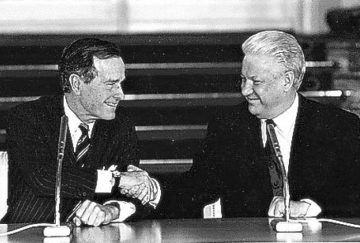 Edward Fishman in the Boston Review:
Edward Fishman in the Boston Review:
While the implementation of U.S. foreign policy has fluctuated widely across administrations, the overarching aims have remained remarkably stable since the end of the Cold War. From George H. W. Bush’s “new world order” to Bill Clinton’s “democratic enlargement,” George W. Bush’s “freedom agenda” to Barack Obama’s “rules-based international order,” the goal has been to extend the reach of democracy and free markets around the globe. During the Cold War, the United States and its allies built one international order, and the Soviet Union built another. For the past thirty years, the United States has sought to universalize the order that survived the fall of the Berlin Wall—a project we can call liberal universalism. Its objective—expanding an order that already existed—explains why there has been little innovation in international organizations since the end of the Cold War, whereas Washington has labored to increase membership in institutions that predate 1989.
The fourth year of Trump’s presidency has ended this history. To be sure, the viability of liberal universalism has been waning for some time—the 2003 invasion of Iraq, the 2008 financial crisis, and the 2016 presidential election sowed serious doubts about the United States’ global role, economic stewardship, and democratic processes. But Washington’s flailing response to COVID-19 has been the nail in the coffin, calling into question the basic competence of the American state and the cohesion of American society. We now face widespread disillusionment not only with U.S. leadership, but with the American political and economic model itself: a crisis of confidence caused by a crisis of competence. Even if Trump loses in a landslide in November, restoring liberal universalism is no longer feasible or desirable.
More here.
